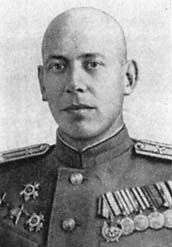
Iakov Feigin
Iakov Feigin was born in 1903 in the area of Chernigov, Ukraine. In 1931, he graduated from the Second Moscow State University. From 1932 to 1941, he worked at the Institute of Economy at the Academy of Sciences of the USSR and was awarded the rank of professor. In 1940 he co-authored the textbook Economical Geography of the USSR and in 1941 he published the monograph The Spatial Distribution of Productive Forces in the USSR.
In July 1941, Feigin was drafted into the Red Army. He began serving as the commander of an artillery platoon and was later promoted to be the commander of a company. According to some accounts, Feigin learned about artillery directly from field experience. In February 1941, he was transferred to an artillery regiment headed by the Jewish general Grigorii Plaskov, in the capacity of political commissar of the regiment. In 1943, Major Feigin was promoted to be deputy commander for political matters of the 10th Artillery Brigade.
Despite be formally a political worker, a number of times Feigin participated in field operations as a commander of his unit. For such actions, he was awarded the Orders of the Red Star and the Order of the Red Banner, as well as receiving other military honors. In May 1942, during the Red Army's retreat in southern Russia, when his regiment was unloading cannons from a train, the commander of the regiment was seriously injured. Commissar Feigin assumed command and, under severe enemy bombing, supervised the unloading without the loss of materiel or ammunition. For this, he was awarded the Order of the Red Star.
In the spring of 1942, due to his high level of education, Feigin was offered the position of lecturer at a military academy in Moscow. Feigin refused the offer since he considered it his duty to be on the front lines.
He received the Order of the Red Banner in April 1945, during the battle of Berlin.
After the war, Feigin was the director of the Institute of Economics of Ukraine and a corresponding member of the Ukrainian Academy of Sciences. He died in 1973.
From the memoirs of General G. Plaskov:
"The more I followed the success of the regiment, the more I was convinced that its roots lay not only in the ability of the commanders. The great educational work that was carried out in each battery also had a great effect. Its living spirit was Commissar Iakov G. Feigin. His soldiers were proud of their commissar. And how they could not be proud! - Iakov Feigin was not just a political commissar, but also, a doctor of economic sciences, a professor, and a corresponding member of the Academy of Sciences!
Feigin worked more than anyone else and studied more than anyone else. Long after midnight I caught him sitting by the light of a gun lantern studying the rules for firing or reading the old artillery textbook by Pavlovich. Within a short time, Iakov learned how to fire artillery and he also mastered tactics. Therefore, when the regimental commander was put out of commission, Feigin was appointed to take his place.
He was a cheerful person who was able to convey his vitality to everybody.
More than once an enemy air raid plastered their positon with bombs. The gunners lost their shelters and lost heart as well – their combat positions had been destroyed. And then Feigin would appear, smiling, and say:
– No harm done? That's good. This is no such a big deal. All we have to do is to dig in again, nothing more.
The guys looked at each other and remarked: "He's right… .
In February a document arrived that the scientist Iakov. G. Feigin is to be withdrawn to Moscow. Iakov resolutely refused. We said to him: "Just think: an important general's position is awaiting for you there in Moscow!"
– No, my place is here, – he replied. – I will stay at the front until the end of the war.
And so, he went with his gunners to Berlin!"
Grigorii Plaskov, Pod grokhot kanonady (Moscow, 1969), p. 230f.
